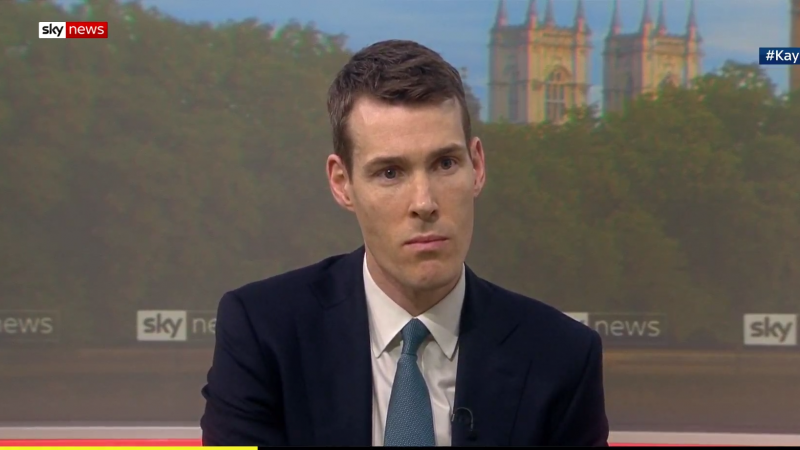
Matthew Pennycook has warned that the government is “not doing enough in terms of investment” following the release of reports showing that the UK is lagging behind on its key goal of reducing greenhouse gases by 78% by 2035.
The Climate Change Committee, an independent advisory body to the government, published two reports this morning on the progress the government has made on its commitment to reduce emissions and on adapting to climate change.
The organisation, created under the last Labour government by the 2008 Climate Change Act, reported that based on the current trajectory the UK government is set to achieve only 20% of its ambitions by 2035.
“The report makes very clear is that the government is not putting the investment in that over the long term will bring savings in terms of the transition. And that’s why we’ve been calling, for the best part of a year now, for a green economic recovery,” Pennycook told Sky News viewers this morning.
“This is a significant moment here. We have the government’s own independent climate advisers sounding the alarm between the yawning gap between the government’s climate rhetoric and its actions and the fact that in lots of areas they still don’t have plans and strategies in place.”
Committee chairman Lord Deben described UK targets as “remarkable” but added that “the policy is just not there”. He warned it is “very clear we need to step up very rapidly”. The committee made more than 200 recommendations, including:
- Replacing the scrapped green homes grant insulation scheme;
- Managing the phase-out of gas boilers;
- New roads should only be built if they can be shown not to increase emissions;
- Stiffer taxes on flights to “address price imbalances” with train travel;
- Carbon taxes on waste, industry and other sectors;
- Bringing forward regulations to ensure all new homes are built to low-carbon standards;
- Public information campaigns to explain to people the changes needed, including the need to cut meat consumption by about a fifth;
- 150,000 public charge points for electric vehicles by 2025; and
- Public sector workers should be encouraged to work from home where possible.
“The Chancellor’s had three fiscal opportunities since the crisis began to lock in that green economic recovery and he hasn’t done so,” shadow climate change minister Pennycook added, highlighting Labour’s call last year for a £30bn stimulus.
“The amount we’re investing pales in comparison to that put into targeted decarbonisation measures in America under the Biden administration and other European countries, whether it’s France or Germany.
“So, we’re not doing enough in terms of investment. We still don’t have from the government plans and strategies – key strategies in place to tell us how we’re going to meet this. And that’s why as the report makes very, very clear, we’re way off track for hitting that net-zero target.”
Pennycook added: “People often talk about the cost of the transition to net zero. There are huge opportunities here in terms of job creation, in terms of a range of health and environmental benefits.
“But if we don’t put that investment in, if we don’t bring those plans forward soon, the costs will increase and the amount of disruption that will have to take place will get worse.”
Labour set out its plan for a drive towards a clean economy focusing on the UK manufacturing sector last November, also focused on tackling a jobs crisis caused by the Covid pandemic, with dedicated funding to low-carbon industries.
The rapid stimulus package focused on the need to recover jobs, retrain workers via an emergency training programme to equip those affected by Covid unemployment, and rebuild business with the creation of a national investment bank.
The green-conscious investment bank, a policy promoted by John McDonnell when he was Shadow Chancellor, would work similarly to those in other countries and ensure that investment always supported the path to net zero.
The Conservative government sold the UK’s green investment bank in 2017, five years after it was formed, to Australian financial group Macquarie. The move was criticised at the time by activists and MPs as “deeply regrettable”.
Labour’s proposals were developed after a consultation held last year invited businesses, sector associations, trade unions, workers, campaign groups and the public to submit ideas for a green new deal in the wake of Covid.
Pennycook launched a ‘just transition’ working group with unions, industry leaders and members of the climate movement committing to ensuring fairness is at the heart of the party’s approach to decarbonisation last month.
Membership of the just group includes shadow ministers Pennycook and Alan Whitehead, representatives from Unite, GMB, UNISON, Prospect and Community, as well as from Green New Deal UK and the New Economics Foundation.
The group will consider the “practical, feasible, affordable and fair policy responses” required with a focus on what transition means for individual sectors such as oil and gas, steel, offshore wind, hydrogen, heat and buildings, and agriculture.
In a speech earlier this year, Starmer argued that people are looking for a government that “puts tackling the climate emergency at the centre of everything we do”. He said: “That’s what I mean when I talk of a future where Britain can be the best place to grow up in and the best place to grow old in.”




More from LabourList
‘Tackling poverty should be the legacy of Keir Starmer’s government’
‘The High Court judgment brings more uncertainty for the trans community’
‘There are good and bad businesses. Labour needs to be able to explain the difference’